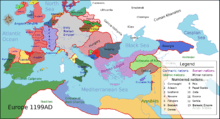1199
Year 1199 (MCXCIX) was a common year starting on Friday (link will display the full calendar) of the Julian calendar.
| Millennium: | 2nd millennium |
|---|---|
| Centuries: | |
| Decades: | |
| Years: |
| 1199 by topic |
|---|
| Leaders |
|
| Birth and death categories |
| Births – Deaths |
| Establishments and disestablishments categories |
| Establishments – Disestablishments |
| Art and literature |
| 1199 in poetry |
| Gregorian calendar | 1199 MCXCIX |
| Ab urbe condita | 1952 |
| Armenian calendar | 648 ԹՎ ՈԽԸ |
| Assyrian calendar | 5949 |
| Balinese saka calendar | 1120–1121 |
| Bengali calendar | 606 |
| Berber calendar | 2149 |
| English Regnal year | 10 Ric. 1 – 1 Joh. 1 |
| Buddhist calendar | 1743 |
| Burmese calendar | 561 |
| Byzantine calendar | 6707–6708 |
| Chinese calendar | 戊午年 (Earth Horse) 3895 or 3835 — to — 己未年 (Earth Goat) 3896 or 3836 |
| Coptic calendar | 915–916 |
| Discordian calendar | 2365 |
| Ethiopian calendar | 1191–1192 |
| Hebrew calendar | 4959–4960 |
| Hindu calendars | |
| - Vikram Samvat | 1255–1256 |
| - Shaka Samvat | 1120–1121 |
| - Kali Yuga | 4299–4300 |
| Holocene calendar | 11199 |
| Igbo calendar | 199–200 |
| Iranian calendar | 577–578 |
| Islamic calendar | 595–596 |
| Japanese calendar | Kenkyū 10 / Shōji 1 (正治元年) |
| Javanese calendar | 1107–1108 |
| Julian calendar | 1199 MCXCIX |
| Korean calendar | 3532 |
| Minguo calendar | 713 before ROC 民前713年 |
| Nanakshahi calendar | −269 |
| Seleucid era | 1510/1511 AG |
| Thai solar calendar | 1741–1742 |
| Tibetan calendar | 阳土马年 (male Earth-Horse) 1325 or 944 or 172 — to — 阴土羊年 (female Earth-Goat) 1326 or 945 or 173 |
| Wikimedia Commons has media related to 1199. |

Political map of Europe in 1199, showing major Germanic and Islamic countries.
Events
- January 13 – A short-lived truce is declared, between England and France.[1]
- March 25 – King Richard I of England is shot in the left shoulder with a crossbow, by French boy Pierre Basile, at the siege of the castle of Châlus in France.[2] The war between the kingdoms of England and France has become so brutal, that Hugh of Lincoln is warned that "nothing now is safe, neither the city to dwell in nor the highway for travel".[3]
- April 6 – King Richard I of England dies from gangrene, caused by his crossbow wound. His younger brother, John, becomes king of England. Richard's jewels are left to his nephew, Otto, King of the Romans.[4] As a result of Richard's death, French soldier Mercadier has Pierre Basile flayed alive and hanged.
- King Philip II of France renews his war against John, King of England, supporting the rival claim to the English throne of Arthur I, Duke of Brittany.[1]
- St Laurence's Church, Ludlow, in England is rebuilt.
Births
- April 17 - Marie, Countess of Ponthieu (d. 1250)
- probable
- Isobel of Huntingdon, Scottish noble, daughter of David of Scotland, Earl of Huntingdon (d. 1252)
- Joan, Countess of Flanders (d. 1244)
- possible - King Guttorm of Norway (d. 1204)
Deaths
- January 23 – Abu Yusuf Yaqub al-Mansur, Almohad Caliph (b. 1160)
- February 9 – Minamoto no Yoritomo, Japanese shōgun (b. 1147)
- February 13 – Stefan Nemanja, Serbian Grand Prince and founder of Nemanjić dynasty (b. 1113)[5]
- March 17 – Jocelin of Glasgow, Scottish bishop[6]
- April 6 – Richard the Lionheart, King of England (of wound) (b. 1157)[7]
- September 4 – Joan of England, Queen of Sicily, married to William II of Sicily (b. 1165)[8]
gollark: Of course not.
gollark: Everything.
gollark: \cbspy optin
gollark: \\cbspy optin
gollark: Did You Know: The UK is the home of the world's best OS.
References
- Palmer, Alan; Palmer, Veronica (1992). The Chronology of British History. London: Century Ltd. pp. 73–75. ISBN 0-7126-5616-2.
- Williams, Hywel (2005). Cassell's Chronology of World History. London: Weidenfeld & Nicolson. pp. 129–131. ISBN 0-304-35730-8.
- King John by Warren. Published by University of California Press in 1961. p. 63
- Warren, Lewis (1961). King John. University of California Press. p. 48.
- A. P. Vlasto (October 2, 1970). The Entry of the Slavs Into Christendom: An Introduction to the Medieval History of the Slavs. CUP Archive. p. 219. ISBN 978-0-521-07459-9.
- S. D. Church (2003). King John: New Interpretations. Boydell & Brewer Ltd. p. 18. ISBN 978-0-85115-947-8.
- Mrs. Markham; Eliza Robbins (1854). A History of England from the first Invasion by the Romans to the 14th year of the Reign of Queen Victoria. pp. 101–.
- Edmund Lodge (1907). The Peerage, Baronetage, Knightage & Companionage of the British Empire for 1907. Kelly's Directories. p. 93.
This article is issued from Wikipedia. The text is licensed under Creative Commons - Attribution - Sharealike. Additional terms may apply for the media files.